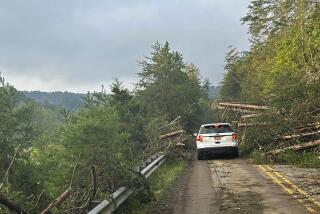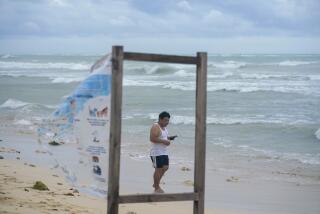Meandering Bertha Sends Thousands Fleeing East Coast
- Share via
MIAMI — Hundreds of thousands of coastal residents from Florida to North Carolina moved inland Wednesday while forecasters puzzled over the eventual path of Hurricane Bertha, which was slow dancing northward off the Eastern Seaboard.
A long-anticipated turn to the north seemed to steer Bertha and its 100-mph winds away from Florida, but forecasters warned that the South Carolina shore, North Carolina’s Outer Banks and other barrier islands could be in danger by today or Friday.
Some strengthening of the hurricane was also possible as Bertha moved northwest out of the Bahamas and over the warm waters of the Gulf Stream.
At 11 p.m. EDT Wednesday, Hurricane Bertha was centered about 200 miles east of Melbourne, Fla. The storm was moving north-northwest at 14 mph. Hurricane warnings were in effect from the Cape Canaveral area in Florida to the Virginia state line.
With top winds of about 100 mph--and the strongest of those blowing out to sea--Bertha was not considered a major threat to life and property. But it was proving to be a major nuisance, and causing major financial expense, as officials of at least four Southern states ordered beachfront evacuations on sunny days at the height of the summer vacation season.
President Clinton canceled a trip to Florida on Wednesday, and countless others in the Southeast had their day disrupted as they monitored Bertha’s progress while packing up, boarding up and waiting in lines for gasoline, food and supplies.
“Unbelievable, unbelievable. I’ve got people lined up at the gas pumps and had them here since about 8 this morning,” said Tracey Batchelor, a clerk in Hatteras Village, N.C. “Some of them are a little panicked, but most of them are upset that they’ve got to go.”
The Navy sent ships from three ports--in Virginia, Georgia and Florida--out to sea in advance of the storm, and pilots flew jets from Patrick Air Force Base, just north of Melbourne, inland for safety.
For two days forecasters at the National Hurricane Center in Miami have been predicting that Bertha would run into a cold front and turn to the north, away from the U.S. shore. But as the storm swirled up the eastern edge of the Bahamas and neared the U.S., that turn was slow in coming.
By late afternoon Wednesday, with the eye of broad-beamed Bertha about 250 miles east of Palm Beach, Fla., hurricane center deputy director Jerry Jarrell announced: “It looks like it’s made the turn now.”
The storm also slowed its forward motion from more than 20 mph to about 14 mph.
Well before Bertha showed signs of changing direction, however, emergency planners decided they could wait no longer. As hurricane warnings were hoisted up the East Coast, local officials ordered evacuations of areas most vulnerable to winds and storm surge.
In North Carolina’s Outer Banks, traffic was bumper-to-bumper for much of the day along the only road from Hatteras Island to the mainland.
“We want to have people out of those areas before the onset of any gale-force winds,” said Tom Ditt, a spokesman for the North Carolina department of emergency management.
Even in north Florida, where skies remained virtually cloudless, vacationers and residents of low-lying coastal areas moved inland, many reluctantly. “We’re getting lots of reservations for tonight just because we’re on the mainland,” said hotelier Nilesh Patel in St. Augustine.
“The hurricane is getting so close . . . we had to move,” said Florida state meteorologist Mike Rucker of the mandatory coastal evacuation of popular and busy summertime vacation spots such as Daytona Beach and Cape Canaveral National Seashore.
At the Kennedy Space Center, NASA rolled the shuttle Atlantis off the launch pad and into the hangar. The Kennedy Space Center visitors center was closed, and about 300 employees went home early.
Florida Gov. Lawton Chiles expressed irritation that hurricane forecasters did not post warnings earlier. “I pray that they’re right, that it’s going north,” said Chiles at a Tallahassee press conference. “But I’d rather err on the side of having people mad at me by having to evacuate, by having to move, as opposed to getting caught.”
Even without a landfall, the hurricane was expected to kick up high seas along the East Coast, delighting surfers but causing beach erosion.
Bertha, the second tropical storm and first hurricane of the 1996 season, rolled through the Lesser Antilles on Sunday, caused serious damage to homes and other buildings in the U.S. and British Virgin Islands on Monday, and then went on to brush by the north coast of Puerto Rico. At least four deaths in the Caribbean have been blamed on Bertha.
More to Read
Sign up for Essential California
The most important California stories and recommendations in your inbox every morning.
You may occasionally receive promotional content from the Los Angeles Times.













